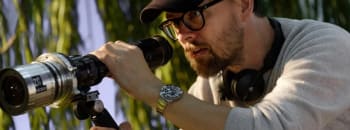Canada flying high with big projects like Disney's Peter Pan & Wendy
Well-established tax breaks and infrastructure and Covid insurance for co-productions are drawing projects in to the country
By John Hazelton 5 Oct 2021

There are signs Canada’s film and TV production industry could emerge from the pandemic busier than ever. Over the last few years, Canada’s well-established tax breaks, highly developed infrastructure and favourable exchange rate have attracted a tide of production from the streaming platforms. Netflix alone says it has spent more than $2.07bn (c$2.5bn) on productions in the country since 2017 and recently announced plans to hire a dedicated executive to work directly with the Canadian creative community.
Canada has been less seriously affected by the coronavirus pandemic than other parts of North America (the death rate has been less than half that of the US) and while its border with the US remained closed to non-essential travel as of mid-May 2021, international film and TV workers have been able to enter since summer 2020 (they must still test negative for Covid-19 before travelling and quarantine for 14 days once they arrive).
The country’s main production hubs re-opened for filming in mid-2020 and by late autumn were reporting pre-pandemic levels of activity. Some US TV series that could not resume shooting in their usual US locations moved north across the border.
The local industry has also been boosted by initiatives such as an $83m (c$100m) insurance backstop scheme for Canadian projects and co-productions offered by the country’s government through Telefilm Canada. More help could come from proposed legislation that will require global streamers active in the country to invest in Canadian content.
The country’s two longstanding federal incentive programmes are the Film or Video Production Services Tax Credit, designed for Canadian or official co-production projects, and the Production Services Tax Credit, for international projects. Most of the country’s 10 provinces and three territories have their own incentives as well, which can be stacked with the federal breaks.
British Columbia (BC) on the west coast remains the busiest province for film and TV production. Features shot recently in BC include a Netflix drama starring Sandra Bullock based on UK miniseries Unforgiven and Disney’s live-action adventure fantasy Peter Pan & Wendy. High-end TV shoots in the province have included Netflix horror series Midnight Mass, Showtime drama Yellowjackets (the true-life story of a plane crash in the Ontario wilderness), Apple TV+ series Pachinko and ABC network drama Big Sky, which relocated to Canada from the US due to the pandemic.
Attraction of Ontario
In the east, Ontario is the country’s second-busiest production hub. The province has hosted features such as Guillermo del Toro thriller Nightmare Alley (which was among the local shoots interrupted for nearly six months by the pandemic), Netflix fantasy adventure Slumberland and Sony action-comedy The Man From Toronto, another project relocated from the US after the pandemic shut down production south of the border. Ontario-based TV projects have included Netflix limited series The Queen’s Gambit, Hulu’s The Handmaid’s Tale and Amazon’s The Boys.
Feature productions that have shot recently in the third-busiest province of Québec — whose largest city Montreal can be used as a stand-in for Paris or New York — have included big-budget sci-fi film Moonfall, with director Roland Emmerich returning to the province where he shot parts of Midway; Hulu’s The United States Vs. Billie Holiday; Kornel Mundruczo’s Pieces Of A Woman; and independent crime drama Misanthrope.
Several of the country’s smaller provinces, including Nova Scotia and Manitoba, have growing film and TV production sectors, and Alberta, the neighbouring province to British Columbia, has moved to attract bigger projects by removing the $8.3m (c$10m) per project cap in its new film and TV tax credit programme. Projects taking advantage of the Alberta pitch have included Focus Features releases Land and Let Him Go and Netflix horror series Black Summer.
Infrastructure and crews
The Canadian industry has traditionally been concentrated in three regional hubs, each with an extensive and experienced crew base and modern infrastructure, though other parts of the country are now developing production capabilities of their own.
On the Pacific coast, British Columbia has around 2.5 million square feet of studio space. Facilities include Mammoth Studios, with three soundstages, including one of nearly 124,000 square feet; Canadian Motion Picture Park Studios, where Netflix has a long-term lease on seven stages; the expanded Eagle Creek Studios; the recently built Vancouver Island Film Studios; and Martini Film Studios, which is planning an expansion of 600,000 square feet. BC has recently been the busiest centre and is the focus of Canada’s VFX and post‑production business.
In the east, Ontario already has about 2.3 million square feet of studio space but rapid growth in TV and streaming production is driving construction aimed at increasing that total to meet escalating demand. Pinewood Toronto Studios — another Netflix base and home to the Mega Stage (at nearly 46,000 square feet) — recently began construction on a multi-stage expansion. Cinespace, operator of Toronto’s Kipling Avenue Studios, has been expanding into the city’s Port Lands redevelopment zone after signing a lease deal with Netflix. Aeon Studio Group opened Bayfront Studios, part of its planned Hamilton Studio District development about 25 miles from Toronto, early in 2020. William F White International opened a third studio location in Toronto as production resumed after the first wave of the pandemic. And VFX firm Pixomondo has opened a virtual production studio in the Ontario capital. To continue the growth, Toronto authorities have invited bids to develop a new, 500,000-square-feet studio on the city’s waterfront near Pinewood.
Québec, with Mels Cite du Cinema studio in Montreal, is the home of the French-language film community and has seen VFX giant Digital Domain open alongside branches of Cinesite, Framestore and MPC.
Growing production hub Alberta has the Calgary Film Centre, with three soundstages, and recently saw the opening of William F White’s Fortress Studio, also in the province’s largest city.
Producers and companies working with international projects that need to steer through the Canadian system include David Gross, head of Toronto and Los Angeles-based outfit No Trace Camping, Roger Frappier’s Max Films in Montreal and TCF Productions in British Columbia.
For the full filming guide of Canada, click here.
Latest news & features
Featured profiles
Promote your services with KFTV
Choose from three profile types - Basic, Silver and Gold
Create ProfileWe offer a range of display advertising opportunities.
Learn More


